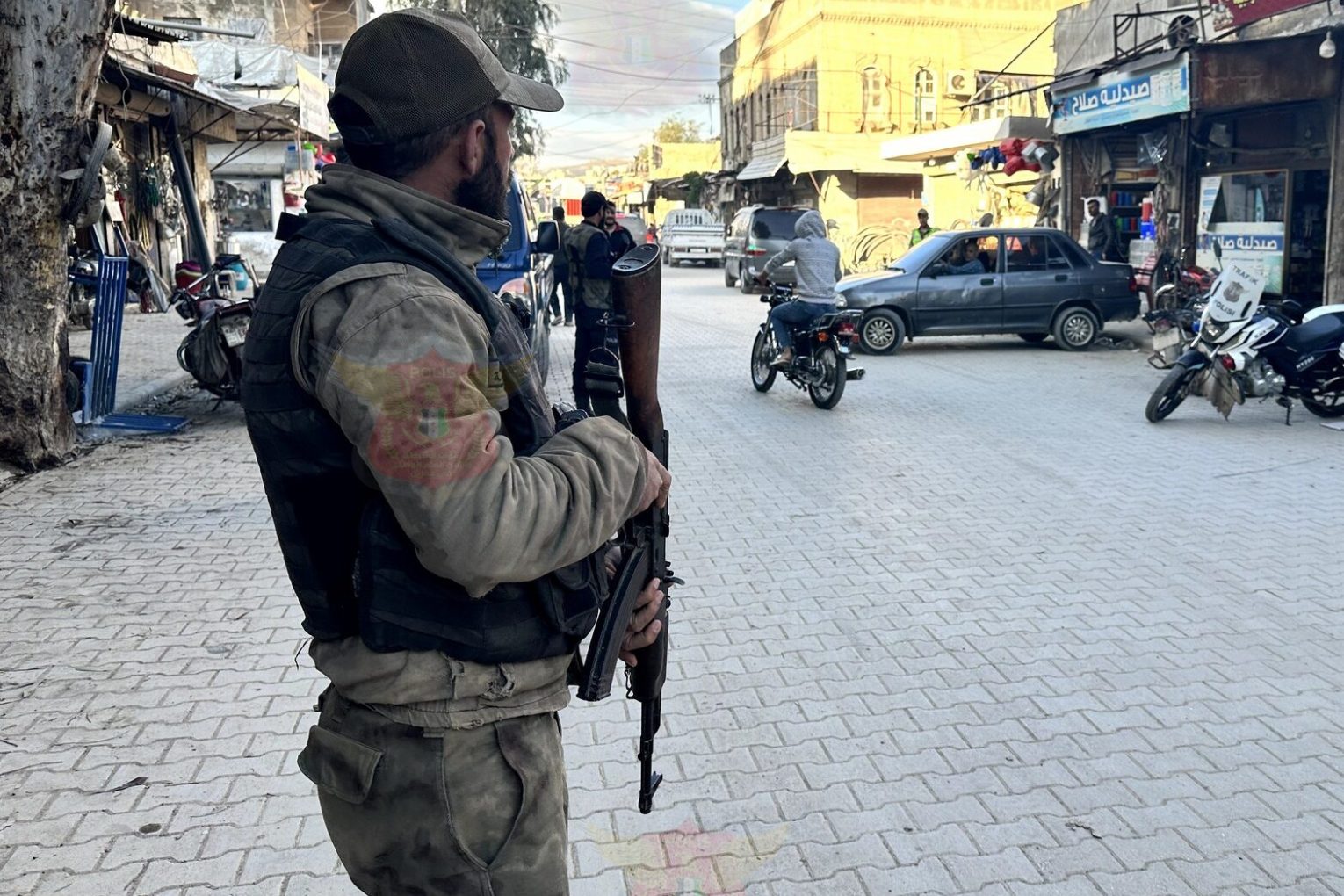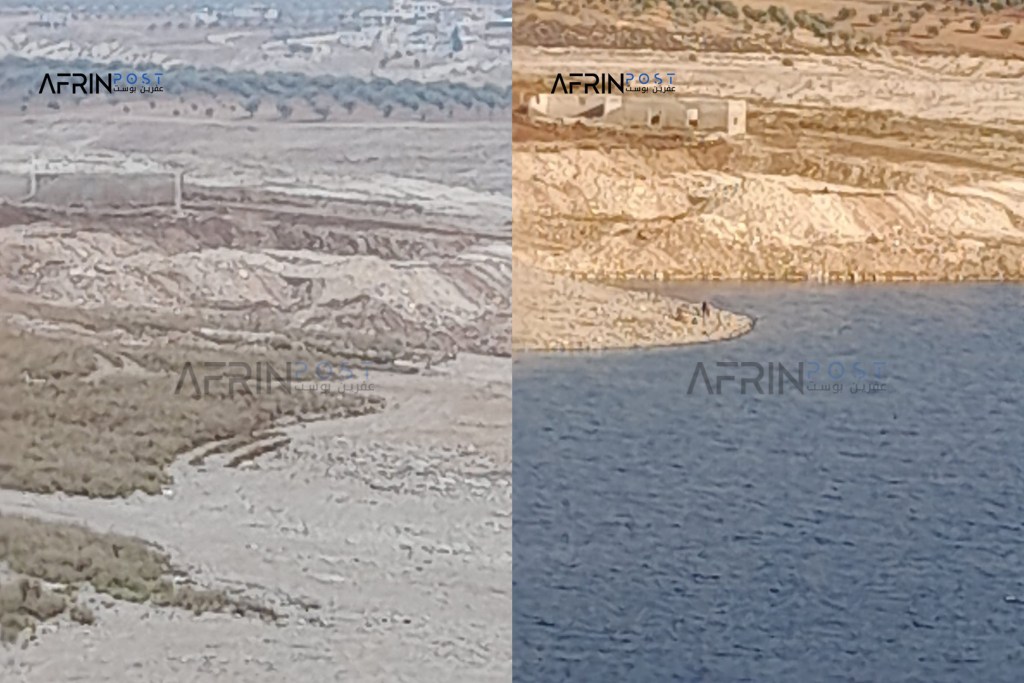
afrinpost-Exclusive
As part of the Turkish authorities’ policy of demographic and cultural change in the occupied Kurdish region of Afrin, a religious Sharia school with the ideology of the Muslim Brotherhood was inaugurated three days ago in the Rajo sub-district, funded by the Pakistani organization “Silani.”
According to our correspondent, in an effort to attract and encourage students to enroll in the school, each student who registers at the school will receive a sum of $150 USD, taking advantage of the prevailing economic conditions.
The opening of religious schools is not a new phenomenon in occupied Afrin; a mosque and preacher school were previously established in the area. Overall, the opening of religious and Sharia schools is part of a broader plan, which includes changes to the curriculum in schools, an increase in religious study sessions, a focus on the Turkish state and its symbols, Ottoman history, and religious education following the ideology of the Muslim Brotherhood. Additionally, religious circles, courses, and lessons are conducted in mosques.
Ankara is implementing a cultural and demographic change plan in Afrin and all the occupied areas in northern Syria, largely financed through Gulf-based Islamist organizations, mobilizing funding for the construction of schools and settlement projects.
The Muslim Brotherhood’s Funding Strategy for Turkey’s Political Agenda:
Ankara has established an Islamic organization, the “International Association of Non-Governmental Organizations in the Islamic World (IDSB),” comprising associations with Muslim Brotherhood backgrounds. This organization serves as Turkey’s tool for intervening in neighboring countries’ affairs and attracting funding for its agendas. It operates under the guise of supporting Muslims, humanitarian and relief aid.
The founding conference was held in Istanbul on May 1, 2005, with the theme “The Union of NGOs of the Islamic World”: Seeking a New Vision in a Changing World.” More than 300 non-governmental organizations from over 40 countries participated. The organization was officially established on December 30, 2005, receiving the status of an “international organization” through a decision by the Turkish Council of Ministers and the approval of the Turkish Presidency. Despite being an international Islamic organization, all its annual meetings have been held in Turkey, where its primary activities are centered, with Ankara directing its activities.
The “The Union of NGOs of the Islamic World” functions as a parallel entity in terms of its mission, directions, and loyalty compared to the Union of Muslim Scholars. It has multiple objectives, including promoting and implementing Ankara’s political agenda while portraying Turkey as a Sunni leader in the Islamic world. It gathers funding under the guise of supporting Muslims and humanitarian aid in Syria through organizations affiliated with it across the Arab world, and these funds effectively end up in the hands of the Justice and Development Party (AKP) through the Turkish Humanitarian Relief Foundation.
A report by the Turkish newspaper “Yeni Şafak” on March 11, 2011, revealed that the AKP collected donations from 52 countries across the Arab and Islamic world, and the funds were placed under Erdoğan’s control, used to establish and support Syrian militias, making them a Turkish proxy army not limited to Syria but also involved in conflicts in Libya and Azerbaijan. Thus, the cost of Turkey’s foreign policy and intervention is kept to a minimum in terms of both finances and personnel.
President Erdoğan exploits the historical resentment upon which the Muslim Brotherhood’s ideology was founded and their loyalty to the Ottoman state. Historically, the Muslim Brotherhood was founded in 1928, after four years of turmoil following the abolishment of the Ottoman caliphate by Mustafa Kemal Atatürk. Some have adopted the idea that the Ottoman Empire embodied Islamic unity. The organization drew inspiration from its founder, Hassan al-Banna, and later Sayyid Qutb, who was greatly influenced by the Pakistani preacher Abul Ala Maududi, known as the “Father of Islamism” and a significant advocate of violent extremism. Maududi was himself associated with defending the Ottoman caliphate, which reached its end in 1924. This historical context helps understand the background.
Overall, the economy holds exceptional importance for the Muslim Brotherhood, going beyond being a source of the group’s power. It is a crucial tool for executing its ideological and political project. It is employed to penetrate societies and attract supporters through projects executed under humanitarian and service-related titles, exploiting these sectors to realize the political agenda, and the Muslim Brotherhood entities have an extensive economic empire comprising various economic institutions and charities worldwide. President Erdoğan has recognized this and leveraged the organization’s funding for the implementation of his political project at little to no cost, particularly in the occupied areas of Syria.
With the Turkish military occupying areas in northern Syria, Ankara mobilized Muslim Brotherhood-affiliated associations in different Arab and Islamic countries, under religious and humanitarian slogans. Substantial funding has flowed, and mosque construction has been one manifestation of this funding to achieve several objectives. Turkish authorities have taken a particular interest in education, as its results are long-term. The Turkish Disaster and Emergency Management Authority (AFAD) managed the educational reality and curriculum in the areas under Turkish control under the supervision of the Directorate of Religious Affairs (Diyanet). Dozens of religious schools were built and opened in the region through external Qatari, Kuwaiti, and Palestinian (Arab 48) funding and the activities of Islamist organizations from Pakistan.
The opening of schools with Pakistani funding in northern Syria is not a recent development. In the occupied city of Ras al-Ain/Serekaniye, the Pakistani organization “Baitussalam” inaugurated a bakery and a school named “Salem al-Mara’i” on March 23, 2021. The event was attended by the Governor of Şanlıurfa, Abdullah Arın, members of the local council of Ras al-Ain, representatives of the Turkish Disaster and Emergency Management Authority (AFAD), and officials from the Turkish Ministry of Education in Şanlıurfa.
Pakistani Presence and Funding in Northern Syria:
“Baitussalam” is a Pakistani charitable organization founded in Karachi in 2010. It claims to work in the field of Islamic missionary activities (following the Muslim Brotherhood’s ideology) and in various areas, including education, culture, youth, health, and humanitarian relief. The organization coordinates its activities in Syria exclusively with the Turkish Disaster and Emergency Management Authority (AFAD) and the Turkish Religious Foundation. The organization officially joined the The Union of NGOs of the Islamic World (IDSB) on July 30, 2019.
The organization also inaugurated nine schools in the “Iman” camp in Azaz, comprising 130 classrooms. The opening ceremony was attended by the Governor of Kilis, Khagan Yaowuz Erdogan, and Ismail Balıkcıoğlu, the Deputy Chairman of AFAD.
On January 12, 2020, in cooperation with the Pakistani charity organization “Muslim Hands,” a high school was opened in Jarablus, named after the Deputy Governor of Gaziantep, Ahmed Turgay Imam Ghailar. The opening ceremony was attended by Turkish officials, including the Governor of Gaziantep and a member of the Turkish Parliament from the Justice and Development Party (AKP).
The organization “Muslim Hands” is an Islamic charity organization founded in Nottingham in 1993. It is a non-governmental organization active in over fifty countries worldwide, providing assistance to disaster victims and those affected by conflicts.
In collaboration with humanitarian and Pakistani relief organizations, a school was opened in Tell Abyad on July 23, 2022. The opening ceremony was attended by the Deputy Governor of Şanlıurfa, Oguzhan Erdoğan.
On December 13, 2021, the “Hamam al-Turkman Elementary School” was inaugurated in Tell Abyad with contributions from the Pakistani charity organizations “UC3” and “EIYD,” based in Gaziantep, Turkey. The school was rehabilitated in coordination with the Directorate of Education in Şanlıurfa. Its sign bears the inscription “Greater Rome Municipality.”
Also, the charity organizations “Ansaar al-Khayriyah” and “Bait al-Maal” (the Pakistani National Relief Foundation) rehabilitated a school in the village of Khirbat al-Raz in the countryside of Tell Abyad in 2022 to spread extremist ideology.












